#phoebus achilles
Text
Forest Animals v Achilles

Forest Animals
Animal: Squirrels, Birds, Bunnies, Turtle
Person: Snow White
Movie: Snow White and the Seven Dwarfs (1937)
Achilles
Animal: Horse
Person: Phoebus
Movie: The Hunchback of Notre Dame (1996)
#disney animated movies#disneyanimalbesties#disney#disney tournament#yen sids poll#snow white#snow white and the 7 dawrfs (1937)#horse#animals#forest animals#achilles#phoebus#the hunchback of notre dame 1996
29 notes
·
View notes
Text
captain phoebus is uncannily similar to wars


look at this shit. they are long lost twins, your honor
#phoebus even has the same fucking. roman nose that quirkle gives to wars#also. spoilers for hnd but#phoebus' achilles sit and achilles heel commands are top tier#(his horse is named achilles! btw in case that wasnt obvious)#linked universe warriors#raven rambles
4 notes
·
View notes
Text
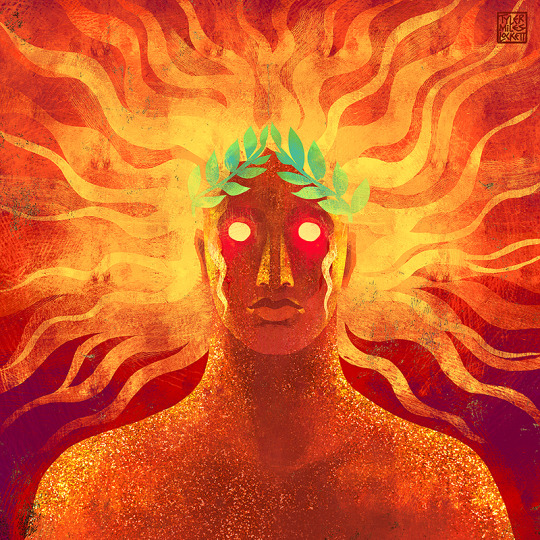
Hey folks, this image of Apollo was done for a private commission. Xoxo
The following text is reposted from my previous Apollo Olympians image.
“Phoebus, of you even the swan sings with clear voice to the beating of his wings, as he alights upon the bank by the eddying river Peneus; and of you the sweet-tongued minstrel, holding his high-pitched lyre, always sings both first and last…And so hail to you, lord! I seek your favor with my song.” (-Homeric Hymn, translated by H.G. Evelyn white)
APOLLO (uh-PAH-low), God of prophecy, oracles, music, art, protector of and disease of boys and men, and archery. Just as his twin sister Artemis is patron to women and girls, Apollo is both protector, and killer from disease of boys and men. In my Illustration the god holds his bow and arrows behind, while he strums the lyre gifted to him by trickster Hermes. Near the sun flies his ally and divine messenger, a white raven. The column on the right is capped with a cow, representing his sacred animal as a god of herds. The serpent Python sits dead at his feet, killed by Apollo’s arrow so that the god could take over the Delphi temple location. The temple complex sits beneath the god, while on the far right, the Pythia (Apollo’s oracle priestess) sits upon a tripod, breathing the hallucinatory gasses seeping up from the earth to get her prophecies which she bestows upon visitors.
The laurel tree has associations with Apollo because the god, chasing a Naiad (water nymph) named Daphne call out to Gaia (mother earth) for help, who transformed the nymph into a laurel tree, which the god adopted as his sacred tree. In book 1 of the Iliad, Apollo supports the Trojans by raining down a plague on the Greeks, and later helping Paris to kill Achilles. Apollo’s cruelty is shown in Ovid’s mythical lyre contest with the inventor of the flute; a satyr named Marsyas. When Apollo suggested they play their instruments upside down, the satyr lost, and was flayed (skinned) alive as punishment for his hubris.
#pagan#hellenism#greek mythology#tagamemnon#mythology tag#percyjackson#dark academia#greek#greekmyths#classical literature#percy jackon and the olympians#pjo#homer#iliad#classics#mythologyart#art#artists on tumblr#odyssey#literature#ancientworld#ancienthistory#ancient civilizations#ancientgreece#olympians#greekgods#zeus#hesiod
4K notes
·
View notes
Text
also gideon's body kept in perfect stasis from her connection to john in the same way the gods keep hector's body from decaying despite achilles' mutilating acts, stopping it from rotting in the sun. that too.
emily wilson iliad translation:
And yet the pack of dogs did not maul Hector. The goddess Aphrodite, child of Zeus, kept them away both day and night and used immortal rose oil to anoint the body, so that Achilles, when he dragged it round, would cause no lacerations to the skin. Phoebus Apollo sent a dark dense cloud from heaven to the plain and covered up the area where Hector’s body lay, so that the power of the sun would not shrivel the skin around his limbs and sinews.
as yet unsent:
The corpse has still failed to rot. The princess says they are leaving it outside in significantly fluctuating temperatures, under observation, and it still fails to rot.
#gideon nav#john gaius#feeling good! normal even#i know people have broken down the iliad and odyssey comparisons before#so i'm not saying anything new#but i like talking about it anyways tbh
137 notes
·
View notes
Text
fun facts i learned from listening to the hunchback audio commentary
tony jay doesn’t know how to do a spit take
they literally named phoebus’ horse “achilles” for the sheer sake of the “achilles, heel” pun
kevin kline fucked up a lot of takes by whacking his prop sword off the microphone (which he insisted on using to “get into character”)
the only scene in the film to use june withers’ voice as laverne is the scene leading up to “a guy like you”
after phoebus says “will we allow it?” during the battle of notre dame, the gargoyles were originally meant to say: “what did he say?” “he said he lost his wallet!”
the hidden sattelite dish during the bird’s eye view shot during “out there”
the hidden donald and goofy statutes on one of notre dame’s ledges just before quasi takes esmeralda and djali down the cathedral
jason alexander stuffed his face with bbq chips for the “i thought i was the cute one!” line
one of the few times actors were in the recording studio together was jason alexander & charles kimbough to record “a guy like you”
#hond#idk whY i never posted this here there's some fun stuff#i watched the commentary back in 2019 why has this just been rotting in my drafts#The Hunchback of Notre Dame#hunchback of notre dame
48 notes
·
View notes
Text
"Be hushed, ye that hear, at the song to Apollo; yea, hushed is even the sea when the minstrels celebrate the lyre or the bow, the weapons of Lycoreian Phoebus. Neither doth Thetis his mother wail her dirge for Achilles, when she hears Hië Paeëon, Hië Paeëon."
- Callimachus, Hymn to Apollo
22 notes
·
View notes
Text
The parallels between Hector and Patroclus, and between Achilles and Andromache, in the last books of the Iliad:
As I was reading through the Iliad, I was struck by how strongly Hector and Patroclus parallel each other in their last moments.
I'm not exactly making an argument that they parallel each other throughout the Iliad, or saying that Hector does not act like a foil for Achilles throughout the narrative too, but I did find it extremely interesting, especially in association with the parallels between Achilles and Andromache.
They are both first given a grave disadvantage by a god, Athena in Hector's case and Apollo in Patroclus'. Athena interferes with Hector by appearing as Deiphobus and then disappearing when he is in need of assistance. Apollo interferes with Patroclus by striking the breath out of him and knocking off all of his armor, so he stands on the battlefield defenseless.
They bear a similar reaction to the loss of their weapons. Both stand still in shock for a moment, and both of these phrases are at the beginning of a line and are immediately followed by a caesura: 16. 806- στῆ δὲ ταφών: ὄπιθεν δὲ μετάφρενον ὀξέϊ δουρὶ 'he stood dazed. But from behind on his back with a sharp spear...' and 22. 293- στῆ δὲ κατηφήσας, οὐδ᾽ ἄλλ᾽ ἔχε μείλινον ἔγχος. 'he stood mute in horror, as he did not have his ashen spear.'
There is a repeated structure of 'three times and on the fourth,' something changes.
16. 784-789:
τρὶς μὲν ἔπειτ᾽ ἐπόρουσε θοῷ ἀτάλαντος Ἄρηϊ
σμερδαλέα ἰάχων, τρὶς δ᾽ ἐννέα φῶτας ἔπεφνεν.
ἀλλ᾽ ὅτε δὴ τὸ τέταρτον ἐπέσσυτο δαίμονι ἶσος,
ἔνθ᾽ ἄρα τοι Πάτροκλε φάνη βιότοιο τελευτή:
ἤντετο γάρ τοι Φοῖβος ἐνὶ κρατερῇ ὑσμίνῃ
δεινός:
Three times did he spring at them, equal to swift Ares,
shouting terribly, and three times did he slay nine men.
But when he charged the fourth time, like to a god,
then, Patroclus, did the end of your life appear.
For Phoebus, terrifying, met you in that fierce combat.
22. 165-6, 208-13:
ὣς τὼ τρὶς Πριάμοιο πόλιν πέρι δινηθήτην
καρπαλίμοισι πόδεσσι: θεοὶ δ᾽ ἐς πάντες ὁρῶντο:
Thus three times did they circle around the city of Priam,
with their swift feet, and all the gods were watching them.
ἀλλ᾽ ὅτε δὴ τὸ τέταρτον ἐπὶ κρουνοὺς ἀφίκοντο,
καὶ τότε δὴ χρύσεια πατὴρ ἐτίταινε τάλαντα,
ἐν δ᾽ ἐτίθει δύο κῆρε τανηλεγέος θανάτοιο,
τὴν μὲν Ἀχιλλῆος, τὴν δ᾽ Ἕκτορος ἱπποδάμοιο,
ἕλκε δὲ μέσσα λαβών: ῥέπε δ᾽ Ἕκτορος αἴσιμον ἦμαρ,
ᾤχετο δ᾽ εἰς Ἀΐδαο, λίπεν δέ ἑ Φοῖβος Ἀπόλλων.
But when they arrived at the springs for the fourth time,
then the father held out his golden scales,
and placed on them two fates of woeful death,
one for Achilles, the other for horse-taming Hector,
and having seized the middle of these, he lifted them, and the destined day of Hector sank,
and went to Hades, and Phoebus Apollo left him.
4. The final pieces of dialogue between Patroclus and Hector and then Hector and Achilles follow a very similar formula: the winner lords over the loser, calling him νήπιε (16. 833 & 22. 333), and then the loser as they die, gives a prophecy concerning the winner’s death (16. 851-854 & 22. 359-360) which the winner doesn’t take well. This parallel also clearly functions as one between Hector and Achilles.
5. And what is perhaps the strangest parallel- their final death descriptions are exactly the same.
ὣς ἄρα μιν εἰπόντα τέλος θανάτοιο κάλυψε:
ψυχὴ δ᾽ ἐκ ῥεθέων πταμένη Ἄϊδος δὲ βεβήκει
ὃν πότμον γοόωσα λιποῦσ᾽ ἀνδροτῆτα καὶ ἥβην.
16. 855-7 & 22. 361-3
Achilles and Andromache have decidedly less parallels that can be clearly seen, but I think the fact they play the same role of 'the one left behind' is still deeply interesting.
They are both completely ignorant of the fate of their loved one, and did not even expect it to occur.
17.401- 407:
οὐδ᾽ ἄρα πώ τι
ᾔδεε Πάτροκλον τεθνηότα δῖος Ἀχιλλεύς:
πολλὸν γὰρ ῥ᾽ ἀπάνευθε νεῶν μάρναντο θοάων
τείχει ��πο Τρώων: τό μιν οὔ ποτε ἔλπετο θυμῷ
τεθνάμεν, ἀλλὰ ζωὸν ἐνιχριμφθέντα πύλῃσιν
ἂψ ἀπονοστήσειν, ἐπεὶ οὐδὲ τὸ ἔλπετο πάμπαν
ἐκπέρσειν πτολίεθρον ἄνευ ἕθεν, οὐδὲ σὺν αὐτῷ:
πολλάκι γὰρ τό γε μητρὸς ἐπεύθετο νόσφιν ἀκούων,
ἥ οἱ ἀπαγγέλλεσκε Διὸς μεγάλοιο νόημα.
Not yet did noble Achilles know that Patroclus was dead,
for they were battling very far from the swift ships
under the wall of the Trojans: he never expected in his heart
that he was dead, but that he would return back again alive
having reached the gates, since he did not at all expect him
to sack the citadel without him, nor even with him,
for often did he hear things from his mother,
who secretly reported the intentions of great Zeus to him.
22. 437-446:
ἄλοχος δ᾽ οὔ πώ τι πέπυστο
Ἕκτορος: οὐ γάρ οἵ τις ἐτήτυμος ἄγγελος ἐλθὼν
ἤγγειλ᾽ ὅττί ῥά οἱ πόσις ἔκτοθι μίμνε πυλάων,
ἀλλ᾽ ἥ γ᾽ ἱστὸν ὕφαινε μυχῷ δόμου ὑψηλοῖο
δίπλακα πορφυρέην, ἐν δὲ θρόνα ποικίλ᾽ ἔπασσε.
κέκλετο δ᾽ ἀμφιπόλοισιν ἐϋπλοκάμοις κατὰ δῶμα
ἀμφὶ πυρὶ στῆσαι τρίποδα μέγαν, ὄφρα πέλοιτο
Ἕκτορι θερμὰ λοετρὰ μάχης ἐκ νοστήσαντι
νηπίη, οὐδ᾽ ἐνόησεν ὅ μιν μάλα τῆλε λοετρῶν
χερσὶν Ἀχιλλῆος δάμασε γλαυκῶπις Ἀθήνη.
But Hector’s wife had not heard about him yet,
for no messenger, a true friend, had come
to report to her that her husband remained outside the gates,
but she was weaving in a corner of the tall home,
a double-folded, purple web, upon which she had added many-colored flowers,
and had called to her fair haired attendants in the house
to set a great tripod over the fire, so that there would be
a hot bath ready for Hector when he returned from battle.
Blind to everything, she did not know that far from any bath
grey eyed Athena by the hand of Achilles had killed him.
2. Upon hearing that their loved one has perished, they mourn bitterly and both express a desire to never have been born.
18. 86-7:
αἴθ᾽ ὄφελες σὺ μὲν αὖθι μετ᾽ ἀθανάτῃς ἁλίῃσι
ναίειν, Πηλεὺς δὲ θνητὴν ἀγαγέσθαι ἄκοιτιν.
If only you had stayed there among the immortal sea nymphs,
and Peleus had married a mortal.
22. 479-81:
αὐτὰρ ἐγὼ Θήβῃσιν ὑπὸ Πλάκῳ ὑληέσσῃ
ἐν δόμῳ Ἠετίωνος, ὅ μ᾽ ἔτρεφε τυτθὸν ἐοῦσαν
δύσμορος αἰνόμορον: ὡς μὴ ὤφελλε τεκέσθαι.
But I was in Thebes below wooded Placus
in the home of Eetion, who brought me up when I was young,
an ill fated father to a doomed child; I wish he had not begotten me.
#the iliad#homer#hector of troy#patroclus#achilles#andromache#ancient greek#textual analysis#my own work#translation#dys blurbs#again i'm not sure if these parallels actually mean anything#but they felt striking enough when i was reading
16 notes
·
View notes
Note
You know what i've been thinking about?
The Hunchback of Notre Dame takes place over the span of 20 years. And it takes place in the 1400s. Horses average lifespan during that time is about 15 years. Although proper care can increase a horses lifespan up to about 30 years old. That is very unlikely to happen considering the usage of horses during that time. One of the most common ages for horses to start being ridden is about 3 - 4 years. So let's say Frollos horse is about 4 or 5 years old in the beginning of the movie. Meaning that any other part of the movie where Quasimodo is an adult, Frollos horse should be about 24 or 25. Given that the movie takes place in central Paris, Frollos horse does alot of running and walking on cobblestone. Which would down the horses joints much faster than normal, as well as the different usage of horses. And considering the less advanced vet care, it is very unlikely that a horse would pass another 10 years above the average lifespan. We also never see Frollos horse turn grey, old horses do get a more grey coat as the age. Unless Frollo would more or less retire his horse or only rode during certain events, there is a very low probability that the horse seen in the end of the movie is the same as in the beginning. Frollo probably switched horse at least once during the duration of the movie. Frollos horse either died or retired during the duration of the movie. It might have been Snowball in the beginning but it was more likely Snowball jr in the end of the movie.
Also, a minor detail. The horses in that movie might be predatory. Phoebus horse, Achilles has forward facing eyes. Snowballs eyes are more on the side of the head, but Achilles eyes are not.
i dont know what to do with this information
21 notes
·
View notes
Text
as said last evening, I've finished it during class today. I think I might paint Phoebus and Achilles in the upcoming days. (plus silly frollo cat doodle because I was thinking of the 1939 version and his absurd amount of felines.)


15 notes
·
View notes
Text
Disney Horses
Disney has never tried doing a franchise focused on their equine characters, and I am disappointed. So here is a partial compilation of Disney horses--namely the ones I think would be the most marketable--just in case Disney should ever change their mind on that point and wants a reference guide to which horses they should include in the line.
Major (Cinderella, 1950)
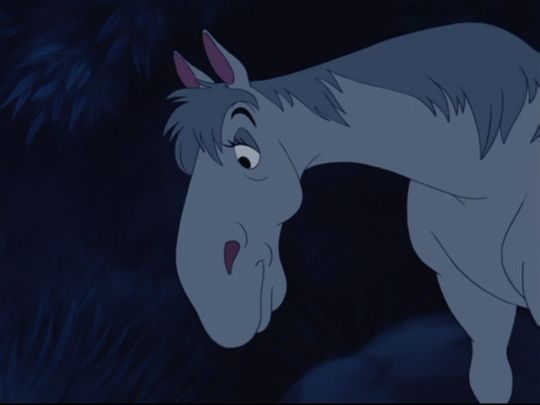
Major is a gray stallion who is temporarily transformed into a coachman for Cinderella's night at the ball.
Samson (Sleeping Beauty, 1959)
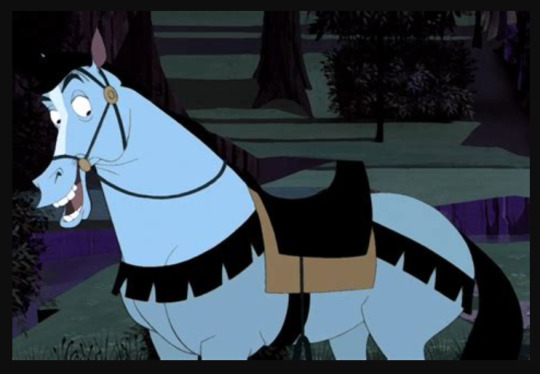
Samson is a gray stallion belonging to Prince Phillip. He is shown to be fast and fearless, and he hates distractions and detours.
Captain (101 Dalmatians, 1961)
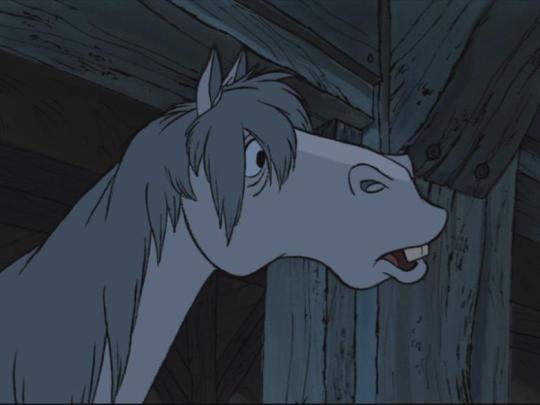
Captain is a gray draft stallion who lives in the English countryside. He is instrumental in aiding in the rescue of Pongo and Perdita's puppies, and helps provide them with shelter and protection during their trek back to London.
Frou Frou (Aristocats, 1970)
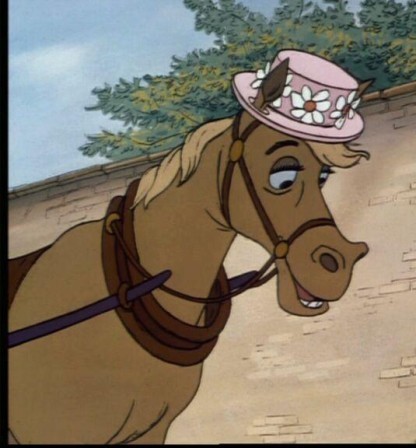
Frou Frou is a flaxen chestnut light draft mare belonging to Madame Adelaide Bonfamille of Paris, France. She is a close friend of Duchess and her kittens. She is the only mare to be prominently featured in a Disney animated feature film with a specific storyline. Fantasia (1940) features a pegasus mare in one of its sequences (the mother of Peter Pegasus).
Philippe (Beauty and the Beast, 1991)

Philippe is a flaxen chestnut Belgian draft stallion who belongs to Maurice and Belle. He is very cautious and skittish, but bravely returns with Belle to the Beast's castle to find her father.
Achilles (The Hunchback of Notre Dame, 1996)
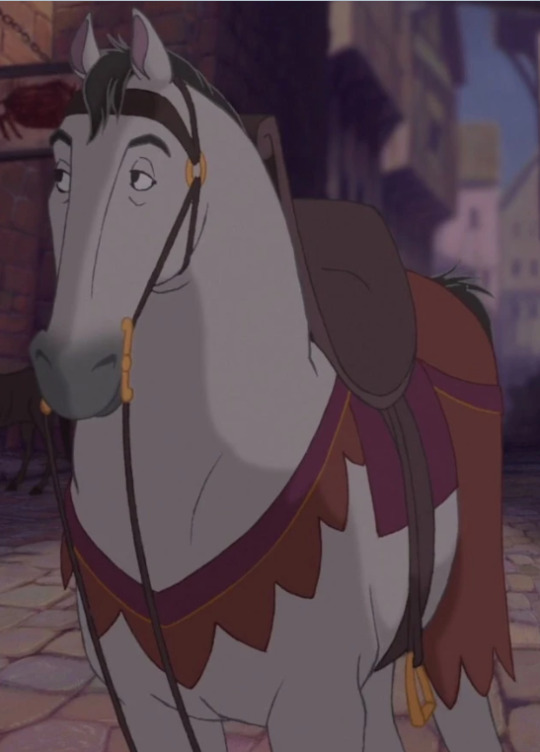
Achilles is a gray warhorse who belongs to Captain Phoebus. He is trained to respond to commands the same way a dog would, and even knows how to sit and heel. He appears to get along with Frollo's Friesian stallion Snowball, despite their owners being on opposites sides.
Pegasus (Hercules, 1997)
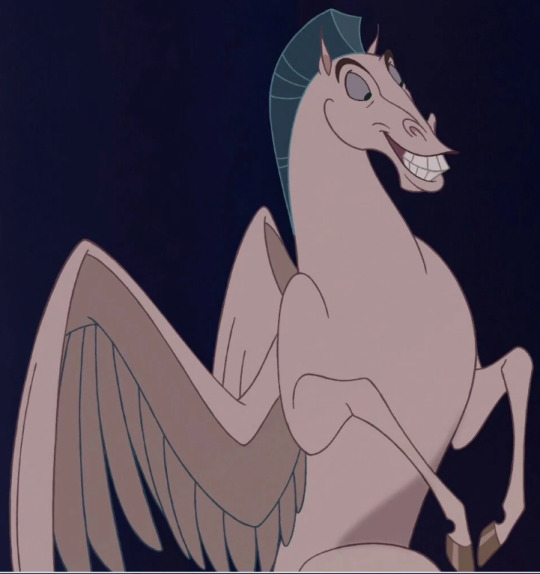
Pegasus is a pegasus stallion belonging to Hercules. He is white with a blue mane and tail. Pegasus isn't the most intelligent horse, but he's very loyal and courageous.
Khan (Mulan, 1998)
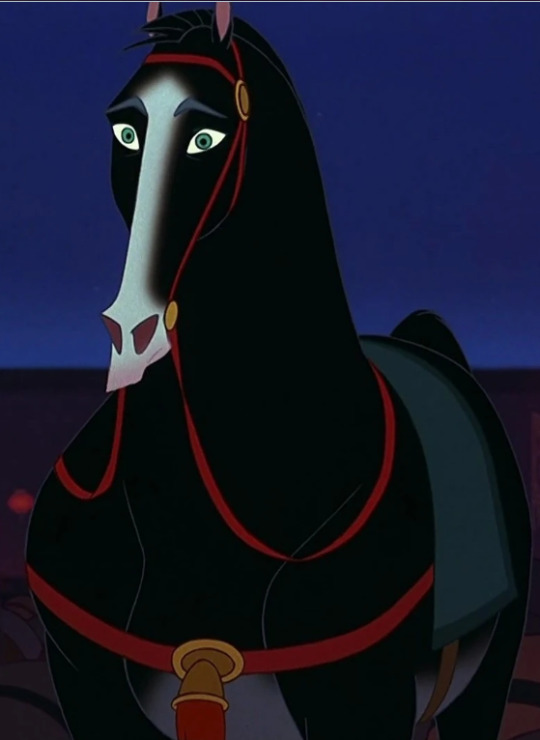
Khan is Mulan's faithful black stallion. He carries her into battle against the Huns.
Bullseye (Toy Story 2, 1999)

Bullseye is a chestnut stallion who serves as Woody's loyal steed in the children's show that spawned the toy line Woody is part of. In the Toy Story films, Bullseye is Jessie's closest friend and ally.
Buck (Home on the Range, 2004)
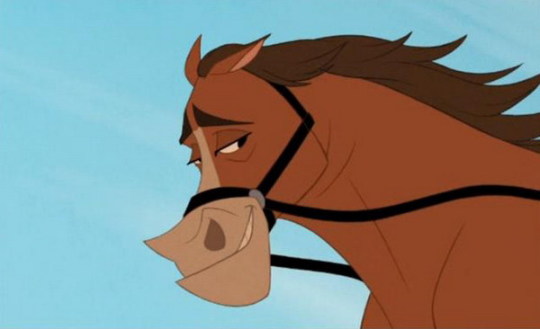
Buck is a bay stallion belonging to Sheriff Brown. He is incredibly egotistical and admires the bounty hunter Rico until he learns Rico is working for the notorious Alameda Slim.
Maximus (Tangled, 2010)
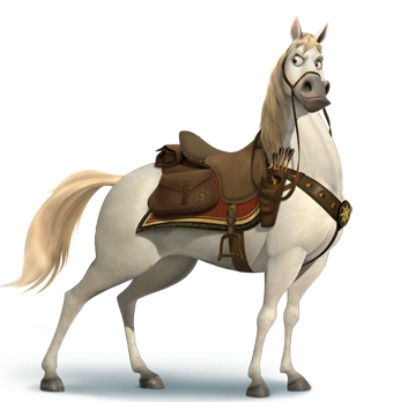
Maximus is a light silver Andalusian stallion who loyally serves the Captain of the Guard, acting as both his mount and his right hand man. He is intelligent, brave and fiercely patriotic. He dedicates his life to protecting Princess Rapunzel on all her adventures.
Angus (Brave, 2012)
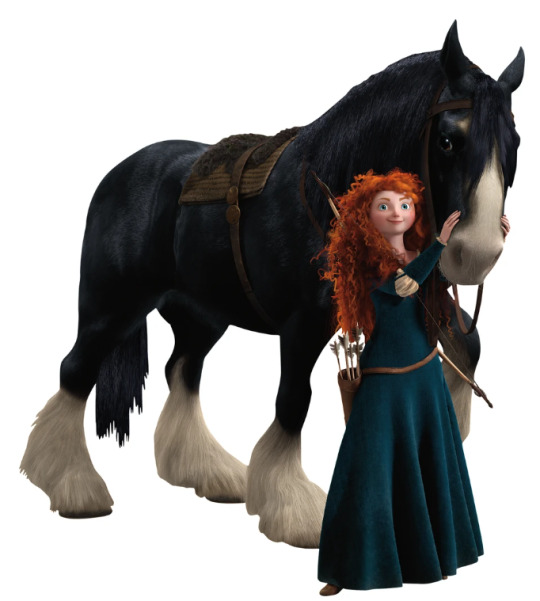
Angus is a black Shire stallion who serves as Merida's mount and best friend. He has good judgment and hates having to carry Merida into danger, but will do so if the cause is just.
Sitron (Frozen, 2013)
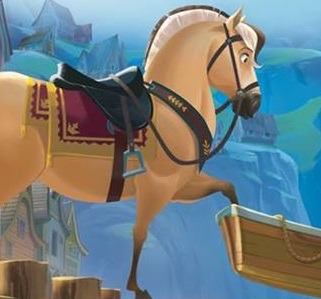
Sitron is a brunblakk (brown dun) fjord stallion who belongs to Prince Hans of the Southern Isles. Despite his owner's sinister nature, Sitron is a polite, friendly horse with fast reflexes and an instinct to protect.
Fidella (Tangled the Series, 2017)
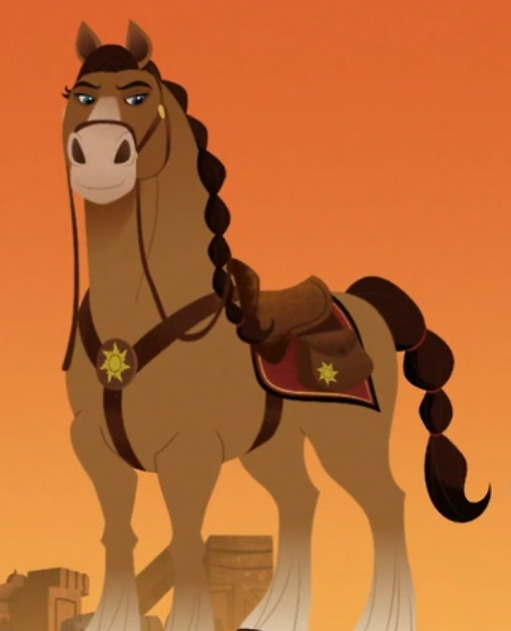
Fidella is a bay draft mare who belongs to Cassandra. She is fast, strong and brave, and Maximus develops a crush on her. Fidella does not come from a feature film, but this list desperately needed another mare.
The Nokk (Frozen II, 2019)

The Nokk is a Scandinavian water spirit tamed by Elsa. It serves as her mount. While it is Elsa's friend and allows her to ride it, it is still very wild and will drown trespassers on the Dark Sea.
70 notes
·
View notes
Note
How is the design of your Thetis?

I actually had already drawn and posted two drawings of Thetis, but I deprived them, so here is she! Inspired by the versions of the myth where Apollo lies to Thetis about her motherhood, because I think Thetis' relationship with the Olympians is too interesting not to explore. Sure, I could have drawn another deity, but I really enjoy drawing my Apollo, so it's Apollo.
He dwelt on my happiness in my children, whose days were to be many and unacquainted with disease; and, comprising all, in triumph-strain that cheered my soul, he praised my lot, blest of the gods. And so I deemed that falsehood sat not upon Phoebus’ lips divine, fraught with the prophet’s art. But he, who raised this song himself, he who himself was present at my marriage-feast, he who himself spake thus, he it is who himself hath slain my son.
Aeschylus' attributed fragments, frag 189 . Translation by Herbert Weir Smyth.
Him did the Bride of Zeus behold, and straight upbraided with exceeding bitter words: "What deed of outrage, Phoebus, hast thou done this day, forgetful of that day whereon to godlike Peleus' spousals gathered all the Immortals? Yea, amidst the feasters thou sangest how Thetis silver-footed left the sea's abysses to be Peleus' bride; and as thou harpedst all earth's children came to hearken, beasts and birds, high craggy hills, rivers, and all deep-shadowed forests came. All this hast thou forgotten, and hast wrought a ruthless deed, hast slain a godlike man, albeit thou with other Gods didst pour the nectar, praying that he might be the son by Thetis given to Peleus. But that prayer hast thou forgotten, favouring the folk of tyrannous Laomedon, whose kine thou keptest. He, a mortal, did despite to thee, the deathless! O, thou art wit-bereft! Thou favourest Troy, thy sufferings all forgot. Thou wretch, and doth thy false heart know not this, what man is an offence, and meriteth suffering, and who is honoured of the Gods? Ever Achilles showed us reverence -- yea, was of our race. Ha, but the punishment of Troy, I ween, shall not be lighter, though Aeacus' son have fallen; for his son right soon shall come from Scyros to the war to help the Argive men, no less in might than was his sire, a bane to many a foe. But thou -- thou for the Trojans dost not care, but for his valour enviedst Peleus' son, seeing he was the mightest of all men. Thou fool! how wilt thou meet the Nereid's eyes, when she shall stand in Zeus' hall midst the Gods, who praised thee once, and loved as her own son?"
Posthomerica, 3.114-150. Translation by A. S. Way.
Thetis's outfit was inspired by Hesiod's description of Pandora's wedding attire in Theogony:
Forthwith he made an evil thing for men as the price of fire; for the very famous Limping God formed of earth the likeness of a shy maiden as the son of Cronos willed. And the goddess bright-eyed Athena girded and clothed her with silvery raiment, and down from her head [575] she spread with her hands an embroidered veil, a wonder to see; and she, Pallas Athena, put about her head lovely garlands, flowers of new-grown herbs. Also she put upon her head a crown of gold which the very famous Limping God made himself [580] and worked with his own hands as a favor to Zeus his father. On it was much curious work, wonderful to see; for of the many creatures which the land and sea rear up, he put most upon it, wonderful things, like living beings with voices: and great beauty shone out from it.
Theogony, 571-584. Translation by Hugh G. Evelyn-White.
As is usual with my water nymphs, she has very pale skin and black eyes. These blues on her skin are not attempts to draw scales, they are simply marks on her skin. It is more accurate to draw her entirely similar to a human since nymphs were like that in mythology rather than the popular modern-day version, which gives them attributes of their domains (characteristics of fish and plants, for example). But I really like the domains version…so I tried to go somewhere in between. I gave her the fin ears, but didn't go any further than that.
Apollo's outfit may be surprising because Apollo in a long dress like that isn't often portrayed in the popular media, but it was inspired by Apollo Citharoedus statues:

Apollo Musagetes. Roman statue, 2nd century AD. See here.

Apollo Citharoedus. Roman version of a Greek original, 5th century BC. See here.

Apollo Barberini. Roman statue, 1st or 2nd century AD. See here.
Apollo is mentioned as part of the wedding choir alongside the muses in a source, so I thought it would make sense to take inspiration from the statues where he is shown with the lyre. In this third statue, he's even leading a choir of muses, which is why he's in movement.
The most beautiful chorus of Muses sang gladly for the Aeacids on Mt. Pelion, and among them Apollo, sweeping the seven-tongued lyre with a golden plectrum, led all types of strains.
Nemean Ode, 5.23-25. Translation by Diane Arnson Svarlien.
His hair having this specific texture was actually accidental. In the first drawing I did of him, this happened because I wanted to get closer to the original that I was redrawing. I decided to keep it because I thought it looked pretty and because it gives a sun rays look for some reason in my opinion.
15 notes
·
View notes
Text
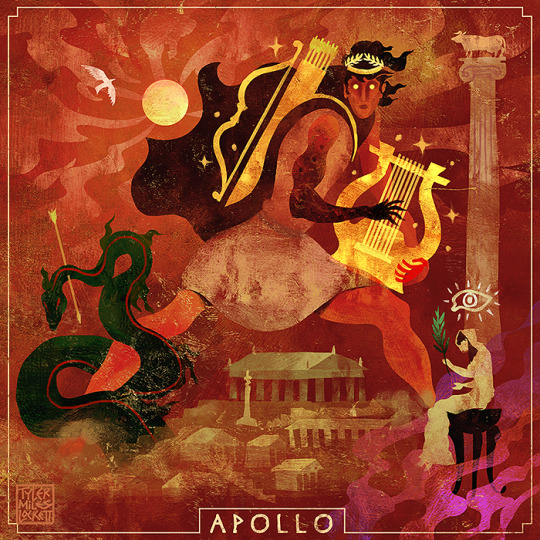
APOLLO
“Phoebus, of you even the swan sings with clear voice to the beating of his wings, as he alights upon the bank by the eddying river Peneus; and of you the sweet-tongued minstrel, holding his high-pitched lyre, always sings both first and last…And so hail to you, lord! I seek your favor with my song.” (-Homeric Hymn, translated by H.G. Evelyn white)
APOLLO (uh-PAH-low), God of prophecy, oracles, music, art, protector of and disease of boys and men, and archery. Just as his twin sister Artemis is patron to women and girls, Apollo is both protector, and killer from disease of boys and men. In my Illustration the god holds his bow and arrows behind, while he strums the lyre gifted to him by trickster Hermes. Near the sun flies his ally and divine messenger, a white raven. The column on the right is capped with a cow, representing his sacred animal as a god of herds. The serpent Python sits dead at his feet, killed by Apollo’s arrow so that the god could take over the Delphi temple location. The temple complex sits beneath the god, while on the far right, thePythia (Apollo’s oracle priestess) sits upon a tripod, breathing the hallucinatory gasses seeping up from the earth to get her prophecies which she bestows upon visitors.
The laurel tree has associations with Apollo because the god, chasing a Naiad (water nymph) named Daphne call out to Gaia (mother earth) for help, who transformed the nymph into a laurel tree, which the god adopted as his sacred tree. In book 1 of the Iliad, Apollo supports the Trojans by raining down a plague on the Greeks, and later helping Paris to kill Achilles. Apollo’s cruelty is shown in Ovid’s mythical lyre contest with the inventor of the flute; a satyr named Marsyas. When Apollo suggested they play their instruments upside down, the satyr lost, and was flayed (skinned) alive as punishment for his hubris.
Support my book kickstarter "Lockett Illustrated: Greek Gods and Heroes" coming in early 2024.
Linktree:https://tr.ee/DcjSQDSEv3
#pagan#hellenism#greek mythology#tagamemnon#mythology tag#percyjackson#dark academia#greek#greekmyths#classical literature#percy jackon and the olympians#pjo#homer#iliad#classics#mythologyart#art#artists on tumblr#odyssey#literature#ancientworld#ancienthistory#ancient civilizations#ancientgreece#olympians#greekgods#agamemnon#troy#trojanwar
624 notes
·
View notes
Note
i’m trying to do more research as i’ve recently started working with apollo, is there any books or further places of research i could us to look further?
khaire anon! thank you for this ask! as always i'm no expert, and this is just my humble opinion.
apollo is quite the complicated god with a long history of worship. i learn something new about him every day, honestly. if you’re looking for basics to research on him, though, here are my suggestions:
-homeric hymns to apollo (hymn 3 and 21). especially hymn 3, it’s a long one, but it covers his birth and the establishment of his temple in delphi. it’s massive to his historical worship and is directly where some of his epithets come from. two that come to mind are dephinius (of the dolphins) and pythian (rotten; apollo takes this name to establish his supremacy OVER the pytho dragon). these hymns are available here or here. the first link is the evelyn white translation to hymn 3 and includes a link to hymn 21, the second is rodney merrill’s translation of hymn 3. i have no preference, as i like to read multiple translations and look for commonalities and differences, but those two i’m fond of.
-check out some of his cult worship. i highly suggest you look into his worship in delphi as your first place, as it’s where his most famous oracle was located, which you can check out here for a brief synopsis to get you started. that being said, he was worshipped all throughout greece and in other areas like turkey, italy and france, so if that interests you, do some research on those topics.
-dig deep into some of his epithets. there’s paean, healer. interestingly, there’s even a specific kind of song named a paean as well. these two (1 2 turn cc on for link 2 for translation) to apollon are some of my favorites. there’s phoebus, shining, his chief epithet. smintheos, lord of mice. musagetes, king of the muses. lykean, of the wolves/of lycia. alexikakos, averter of evil. all of these have so much history behind them that there were specific priests of specific epithets at specific temples devoted to that epithet during the later periods of worship that you can dive into. and these are just a handful of his epithets! pick a few that interest you and dive into a research hole and see what windows open.
-check out the delphic maxims. they can be found here.
-look into his oracle, the pythia. check out pythagoras, the triangle guy. no i’m not kidding he had an entire mystery cult about apollo
-look into his role in the iliad. he’s a major player in that epic, which can be found here. the iliad is a bit complicated to understand, as it’s not a full account of the trojan war -- it actually takes place near the end and begins with a specific conflict between agamemnon and a priest of apollon which then spirals into a whole thing between agamemnon and achilles and like, just a whole Thing(tm). there’s so much to unpack with apollo and the iliad that i’d need a whole other post and like, a works cited to really get into it.
i hope this helps you anon! may your relationship with apollon be fruitful and may the theoi guide you to happiness and peace! best wishes!
#apollo deity#apollo devotion#helpol#hellenic reconstructionism#hellenic polytheism#hellenist#hellenic pagan#apollo#my posts
114 notes
·
View notes
Text
Highlighted Posts - Fandom Topics
For some explanation, see serious topics post.
Avatar the Last Airbender / Legend of Korra:
Aang, forgiveness and violence in The Southern Raiders (meta).
Aang’s (lack of a) character arc (meta) + same response, posted independently from the original chain post with a bit of revisions (meta).
Avatar, violence and last second anti-killing rhetoric (meta).
The actual advice the past Avatars gave Aang (meta).
Aang vs. Ozai final battle and Star Wars influences (meta).
The Great Divide is good actually (meta).
Aang being rewarded by the universe? (meta).
Third season Scorched Earth plan out of left field (meta).
Bloodbending and Energybending (meta).
Katara didn't have a “plot armor” in the final battle with Azula, she's the epitome of a warrior (meta).
Katara and non-lethal battle winning (meta/joke).
Katara didn’t beat Pakku (meta).
Katara didn’t choose Aang “over” Zuko (meta).
Anastasia!Zutara AU (headcanon).
Mai and Zuko, what should have been (meta).
Mai happily joined Azula to hunt Zuko (meta).
Kanna and Pakku... why??? (meta/joke).
Gender equality in the Fire Nation and WW2 equivalents (meta).
Legend of Korra, the status quo and the institution of the Avatar (meta).
Making Korra’s dad chief is just… awful (meta).
Harry Potter:
The Malfoys didn’t have a redemption in canon (meta).
Michael Gambon is great, you guys are just mean (meta).
Snape, Dumbledore and the Defence against the Dark Arts (meta/joke).
No thanks, I don’t need a young Snape movie (joke).
What Harry’s reaction to his name being pulled from the Goblet should have been (joke).
The Tri-Wizard tournament has no rules (meta).
Star Wars:
Star wars and Pirates of the Caribbean are the same story (meta).
Kylo Ren and redemption in the Star Wars universe and Hollywood [tlj post] (meta).
DC:
so... does Superman have an appendix? (joke).
Why Selina Kyle never goes to Arkham (joke).
The Scorpion King/Wonder Woman comparison (joke).
Marvel:
Infinity War and the horror of the snap (meta).
Who’s the avengers’ designer? (joke).
Black Panther and The Lion King similarities regarding women (meta).
Shipping in the MCU (joke).
Antman and family (joke).
Pirates of the Caribbeans:
Elizabeth and Will’s relationship is the heart of the movies (meta).
The best things about PotC (meta).
Disney:
I sort of wrote a one-shot about the bimbettes from Beauty and the Beast (fanfiction).
Belle in the Hunchback of Notre Dame (meta).
Del Toro, monstrosity and Beauty and the Beast (meta).
Inner Workings is amazing (meta).
Frozen’s Anna and Hans (joke).
Quasimodo is awesome (meta).
Around the world with Captain Phoebus (joke).
Pocahontas’ ending is subversive as fuck (joke/meta).
Hercules didn’t know who Hades was (joke).
Other:
Bullshit “feminist” retelling and Mad Max Fury Road (joke/meta).
“Feminist” retellings explanation (analysis).
She-Ra and the inherently good protagonist (meta).
I hate the ending of She-Ra (meta).
Once upon a Time, Regina and redemption (two diverging threads of the same post) (meta): First and Second.
Ross Geller isn’t that bad, you guys are just mean. Or: The unbelievable cruelty of what Carol did to Ross (meta).
Bella Swan and Hermione Granger comparisons are bullshit (meta).
Twilight and depression (meta).
New Moon reread comments (meta).
The Good Place is the greatest show in history. But also I have thoughts (meta).
The single most beautiful Geralt and Jeskier art ever made [The Witcher] (fanart).
Dimitri wanted to find the real Anastasia all along in hopes that she survived the revolution [Anastasia 1997] (meta).
Godzilla, Pacific Rim and Hollywood: between grim-dark and camp (meta).
Wednesday Addams and the usurpation of the summer camp for rich white kids (meta).
Debbie Jellinsky is the best [The Addams Family Values] (joke).
Achilles and Patroclus sitting in an urn. K.I.S.S.I.N.G. (joke).
Of course the Jewish women are the witches in Oz the Great and Powerful… (joke/meta).
Bird Box and mental illness (meta).
My problems with Carmen San Diego (meta).
Ice Princess and teenage movie tropes. Or: They're lesbians Harold (meta/joke).
Lord of the Rings life goals (joke).
The School of Good and Evil and that little bit of antisemitism… (joke).
Game of Thrones / House of the Dragon genetics are weird (joke).
Why wouldn’t I keep talking about old fandoms? (joke/analysis).
I hate Barbie. Sorry. (meta).
#highlighted posts#avatar the last airbender#atla#atla meta#legend of korra#lok#harry potter#hp#hp meta#star wars#sw#sw meta#pirates of the caribbean#potc#potc meta#disney#disney meta#dc#dc meta#marvel#marvel meta#anastasia 1997#the addams family#she ra and the princesses of power#satpop#twilight#friends#once upon a time#ouat#the witcher
11 notes
·
View notes
Text
From what I've seen, Poseidon generally seems to be considered a very temperamental and impulsive god, maybe the most temperamental and impulsive of all his siblings, but in the Iliad at least that is not how he is characterized and in fact we even have some instances where he advises caution to his sister Hera. If anything, she is far more temperamental and impulsive than him in this poem.
In Iliad VIII we have this interaction between Hera and Poseidon: "… lady Hera was angered, and started on her throne, shaking great Olympus, and she addressed the great god Poseidon: 'oh me, Earth-Shaker, wide-ranging in might, does not your heart in your very breast feel for the Danaans who are dying? They bring gifts for you up into Helike, and Aigai too, many of them and pleasing; you used to wish them victory. If only we were willing, we who aid the Danaans, to thrust the Trojans back and check far-thundering Zeus, then he would be sorry sitting there alone on Ida.' Then greatly troubled the lord Earth-Shaker addressed her: 'Hera, reckless in speech, what kind of word have you spoken? I would not wish for the rest of us fight with Zeus the son of Cronus, since he is far the stronger.'". Keep in mind that shortly before this Zeus had ordered all the gods to stay away from the battle and had threatened with severe punishment anyone who would offer assistance to either the Achaians or the Trojans.
In Book XX, it is again Hera who incites the gods to action and Poseidon the one who advises to wait and not do anything rash: "Nor did the son of Anchises escape the notice of white-armed Hera as he set out against the son of Peleus through the throng of men, and she, summoning the gods together, made a speech: 'Consider you two, Poseidon and Athena, in your minds, how this matter will be. Here comes Aeneas armed in gleaming bronze against the son of Peleus, and Phoebus Apollo sets him on; come, let us turn him back on the spot; or rather let one of us stand by Achilles, and grant him great strength, so that he does not fail in spirit, and so he may know that the best of immortals love him, and the other gods are so much wind, they who before warded off the battle host and fighting from the Trojans. …' Then answered her Poseidon who shakes the earth: “Hera, do not rage beyond reason; you should not. I myself would not wish us to drive the other gods together in strife, since we are much the stronger, so let us go aside from the haunts of men and seat ourselves upon a lookout point, and let the war be the concern of mortals. But if Ares starts to fight, or Phoebus Apollo, or if they should keep Achilles back and not let him fight, there and then the strife of battle will arise from our side too. …'"
Also compare the difference between the way Poseidon and Hera conduct themselves in the battle of the gods in Book XXI. While Poseidon encourages Apollon to attack first, being the younger, and reminds him of the insults they both suffered by Laomedon, Hera doesn't wait for Artemis to actually do anything or even talk to her before she hits her with her own weapons and makes her run away in tears.
There are some other instances in the Iliad where Poseidon shows himself to be more cautious and sensible than his reputation suggests. In Book XIII, when Zeus turns his gaze away from the battlefield, Poseidon takes advantage, revitalizing and inspiring the Achaians to fight. However, he takes care to do so secretly and in human guise because he recognizes that Zeus is older and more knowledgeable than him. In book XV, Poseidon is certainly angered by Zeus' attempt to bully him into submission and reacts to the message he receives with harsh and bold declarations, but he recognizes the wisdom in what Iris says to him and does relent and obey eventually even though he considers himself equal to Zeus in honour.
8 notes
·
View notes
Text

Vote for Pocahontas here (closes Friday, 11/10)
Submit songs suggestions for Megara, Mulan, or Jane Porter
Info Post with previous winners
Reasonings for each song option below the cut:
"exile" from folklore

It is hard to watch Quasimodo's heartbreak when he realizes Esmeralda is in love with Phoebus. Esmeralda cares a lot about Quasimodo and does not want to hurt him, but her choice is undeniably the healthiest option given his idolization of her. While he does respect her decision in the end, it is hard for him, and Esmeralda knows that.
I think I've seen this film before
And I didn't like the ending
You're not my homeland anymore
So what am I defending now?
You were my town
Now I'm in exile, seein' you out
I think I've seen this film before
So I'm leavin' out the side door
"I Know Places" from 1989 (TV)

After standing up to Frollo at the Festival of Fools, Esmeralda outsmarts and evades his guards until she takes refuge in Notre Dame (a place she won't be found). When she is captured later in the movie, Notre Dame is once again her sanctuary.
'Cause they got the cages, they got the boxes
And guns
They are the hunters, we are the foxes
And we run
Baby, I know places we won't be found, and
They'll be chasing their tails trying to track us down
'Cause I, I know places we can hide
I know places
"State of Grace" from Red (TV)

This song is about fighting hard for those we love, and the lyrics make use of religious imagery and comaprisons. Both are notable themes for Esmeralda's character. Her solo song is a prayer with Notre Dame as the backdrop. While she is keenly aware of the hardships and injustices of the world, she is still kindhearted and fiercely protective of those she loves, willing to go to great lengths for them.
This is a state of grace
This is the worthwhile fight
Love is a ruthless game
Unless you play it good and right
These are the hands of fate
You're my Achilles heel
This is the golden age of something good and right and real
"Only the Young" featured in Miss Americana

A protest song is perfect for Esmeralda. She stands up to those in power and calls for justice on behalf of the oppressed. Her morals and beliefs are very important to her. Even when she is about to be executed, she remains defiant and refuses to to surrender to Frollo.
They aren't gonna help us
Too busy helping themselves
They aren't gonna change this
We gotta do it ourselves
They think that it's over
But it's just begun
Only one thing can save us
Only the young (only the young)
Can run
#esmeralda#the hunchback of notre dame#taylor swift#disney#disney princess#polls#taylor swift x disney
8 notes
·
View notes